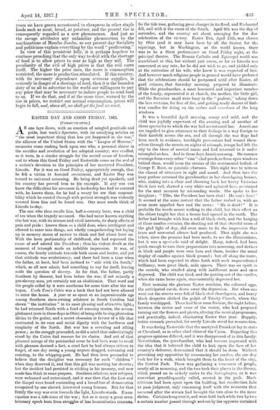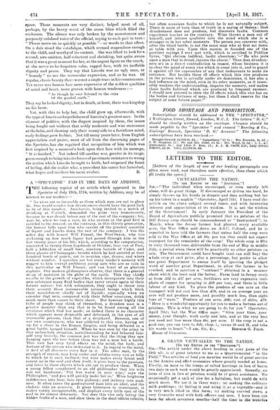A S one lays down, with an emotion of mingled gratitude
and pride, last week's Spectator, with its satisfying articles on " the most important thing that has yet happened in the war," the alliance of the United States with the " League of Honour," memories come rushing back upon one who, a personal sharer in the sacrifice and resolution of her adopted country, was cradled, as it were, in a similar struggle for the sacred cause of freedom, and to whom this Good Friday and Eastertide come as the seal of a nation's devotion to the principles of her martyred President, Lincoln. For it was on Good Friday, appropriately enough, that he fell a victim to frenzied resentment, and Easter Day was turned to universal mourning. Ho being dead yet speaketh, and his country has proved true to his example. If any one can know the difficulties his successor in leadership has had to contend with, he knows them, for he had a weary lot ere that responsi- bility which he carried through with patient strength was violently wrested from him and he found rest. One must needs think of Lincoln to-day.
The one who thus recalls him, half-a-century later, was a child of ten when the tragedy occurred. She had never known anything else but war, with its intense and vivid interests, its sharp effects of pain and pride : known them as a child does, when intelligent and allowed to enter into things, not wholly comprehending but laying up in memory stores of matter to think and feel about later on. With the keen partisanship of childhood, she had espoused the cause of and adored the President ; thus his violent death at the moment of triumph made an indelible impression. It was, of course, the family attitude towards both cause. and leader, and yet that attitude was evolutionary, and there had been a time when the father, at least, had been inclined to " side with the South," which, as all now admit, had something to say for itself, leaving aside the question of slavery. As for that, the father, partly Southern by descent, had been before the war, if not actually a pro-slavery man, yet certainly not an abolitionist. That word and the people called by it were anathema for some time after the war began. Uncle Tom's Cabin was a book that had not been allowed to enter the house. A year or so spent at an impressionable age among Southern slave-owning relations in South Carolina had shown " the institution " in its most pleasing and attractive light ; he had returned North with a fund of amusing stories, the accom- plishment (rare in those days in Ohio) of being able to sing plantation ditties to the guitar, and a secret obsession in favour of a life that contrasted in its ease and social dignity with the hardiness and simplicity of the North. But war has a revealing and sifting power ; as the struggle proceeded, so did a mind that unhesitatingly stood by the Union find reasons for its choice. And out of that pleasant mirage of the patriarchal scene he had been wont to recall with pleasure dawned a fact, a cruel fact he had always striven to forget, of one day seeing a young Regress dragged, screaming and resisting, to the whipping-post. He had then been persuaded to believe that the discipline was necessary for such " children " when they deserved it, and that this girl was meeting her deserts ; but the incident had persisted in sticking in his memory, and now made him think to some purpose. Southern relatives, now refugees, were welcomed and entertained, and it was then that the Law and the Gospel were heard contending and a broad line of demarcation recognized by one shrewd, interested young listener. But for that family the way was ever towards the light, Lincoln-wards. Eman- cipation was a side-issue of the war ; but so is many a great revo- lutionary epoch born from struggles of less humanitarian interests.
So the tide rose, gathering great changes in its flood, and Richmond fell, and with it the cause of the South. April 9th was the day of surrender, and the country set about arranging for the due celebration of the victory. Easter Eve, April 15th, was chosen by Ohio (and it may have been by all the States) for the rejoicings, but in Washington, as the world knows, there was to be a State performance on Good Friday night, at the principal theatre. The Roman Catholic and Episcopal world was
scandalised at this, but without just cause, as far as Lincoln was concerned at any rate, for he did not wish to go, and yielded only at the entreaties of his wife, who knew it was expected of him. And however much religious people in general would have preferred that the celebrations should be postponed until after Easter, all good citizens, that Saturday morning, prepared to illuminate. While the grandmother, a most honoured and important member of the family, represented it at church, the mother, the little girl, and the Bavarian maid wore busy in the " parlour," taking down the lace curtains, for fear of fire, and getting ready dozens of little wax candles for fixing on the sashes and crossbars of the long windows.
It was a beautiful April morning, sunny and mild, and the child was joyfully expectant of the evening and of another of those spectacles to which the war had accustomed her. Americans are impelled to give utterance to their feelings in a way foreign to their kinsfolk across the sea, and all through the war flags had been much in evidence, torchlight processions had wound them- selves through the streets on nights of triumph, troops had left the city to the blare of martial music and had returned to it und3r triumphal arches. And in those days Americans sang. On summer evenings from every other " vine "-clad porch, or from open windows behind them, would issue the strains of the sentimental ballads. of George F. Root, or patriotic choruses. This night was to witness the climax of utterance in sight and sound. And then into the busy parlour returned the grandmother in her churchgoing bonnet., who, sinking into a chair and throwing back her heavy Victorian black lace veil, showed a very white and agitated face, aceonnted for the next moment by astounding words. She spoke to her daughter : " Ellie, the President has been shot ! Ho can't live !" It seemed at the same instant that the father rushed in, with an even more appalled face and the news : " He is dead !" It is probable the words meant nothing to the child, but their effect on the elders taught her that a fissure had opened in the earth. The father had brought with him a roll of black cloth, and the hanging of those sombre curtains, the shutting out of that cheerful room of the glad light of day, did even more to fix the impression that tears and unwonted silence had produced. That night she was taken, since the promise had been made, to see the illuminations, but it was a spectacle void of delight. Many, indeed, had been quick enough to turn their preparations into mourning, and devious is black and purple were seen hero and there, besides the usual display of candles against black ground ; but all along the route, which had been expected to shine forth with such unprecedented brilliancy, were great black, unlit spaces. There was no spirit in the crowds, who strolled along with indifferent mien and soon dispersed. The child was tired, and the putting out of the candles, when she came home again, unaccountably depressed her.
Next morning the glorious Easter sunshine, the coloured eggs, the anticipated carols, drove away the depression. But when one went out the streets were full of black-clad churchgoers, and heavy black draperies clothed the pulpit of Trinity Church, where the family worshipped. There had been some friction, the night before, between the rector and some of the vestry, who had proposed turning out the flowers and plants, altering the musical programme, and practically, indeed, eliminating Easter that year. Happily, better counsels prevailed, for surely Lincoln stood for resurrection.
It was during Eastertide that the martyred President lay in stats at Cleveland, as in other chief cities of the Union. Regarding this progress opinions differed, and it was disapproved of in this family. Nevertheless, the grandmother, who had become impressed with the idea that it behoved the child to look upon the face of her country's deliverer, determined that it should be done. Without provoking any opposition by announcing her resolve, she one day took her for a walk, which brought them to the heart of the city. the Central Park. There was gathering a concourse of people, nearly all in mourning, and the two took their places in the throng, which passed on in orderly ranks to the Sarcophagus, as it was somewhat grandiloquently called, erected in the park. Much criticism had been spent upon the building, but recollection fails to pass judgment, only concerning itself with the momenta that occurred after the stream had brought the two close to the inner shrine. Curtains hung over it, and were held back while two by two a certain number passed through and out by the opposite curtained space. Those moments are very distinct, helped most of all, perhaps, by the heavy scent of the arum lilies which filled the enclosure. The silence was only broken by the monotonous and purposely subdued voice of the official, saying to each pair in turn : " Please move on as quickly as possible "—or words to that effect. On a. dais stood the catafalque, which seemed stupendous enough to the child, and worthy of its content. She was lifted to look fora second, awe-smitten, half-reluctant and shrinking, but quite aware that it was a great moment for her, at the august figure on the couch, at the never-to-be-forgotten calm, rugged face, with its ineffable dignity and peace. They say that Lincoln was an ugly. man, or " homely" to use the vernacular expression, and so he was. Of regular, classic beauty there. was not a single trace in his countenance. Yet never was human face more expressive of the noblest qualities of mind and heart, more graven with human tenderness :—
" As though he ever listened to the cries Of the goaded earth."
They say he lacked dignity, but in death, at least, there was kingship on his brow.
Yet, with this to help her, the child grew up, afterwards, with the typical American forgetfulness of America's greatest man. In the clamour of politics, with the disgust inspired by them, the issues being fought out without that nobly moderate and wise statesman at the helm, and showing only their seamy side to a fastidious mind, early feelings grew feebler. Not till many years later, from English appreciation and praise, most of all from the discerning pages of the Spectator, has she regained that recognition of him which was first inspired by a moment's look upon that face with its message, " It is finished." Not indeed till another war, greater in its range, great enough to bring into its forces of passionate resistance to wrong the nation which Lincoln brought to birth, had reopened the fount of feeling, did she realize Wins:, a precedent his career ha:s furnished,
what 'Mises and resolves his name evokes. B.



























 Previous page
Previous page